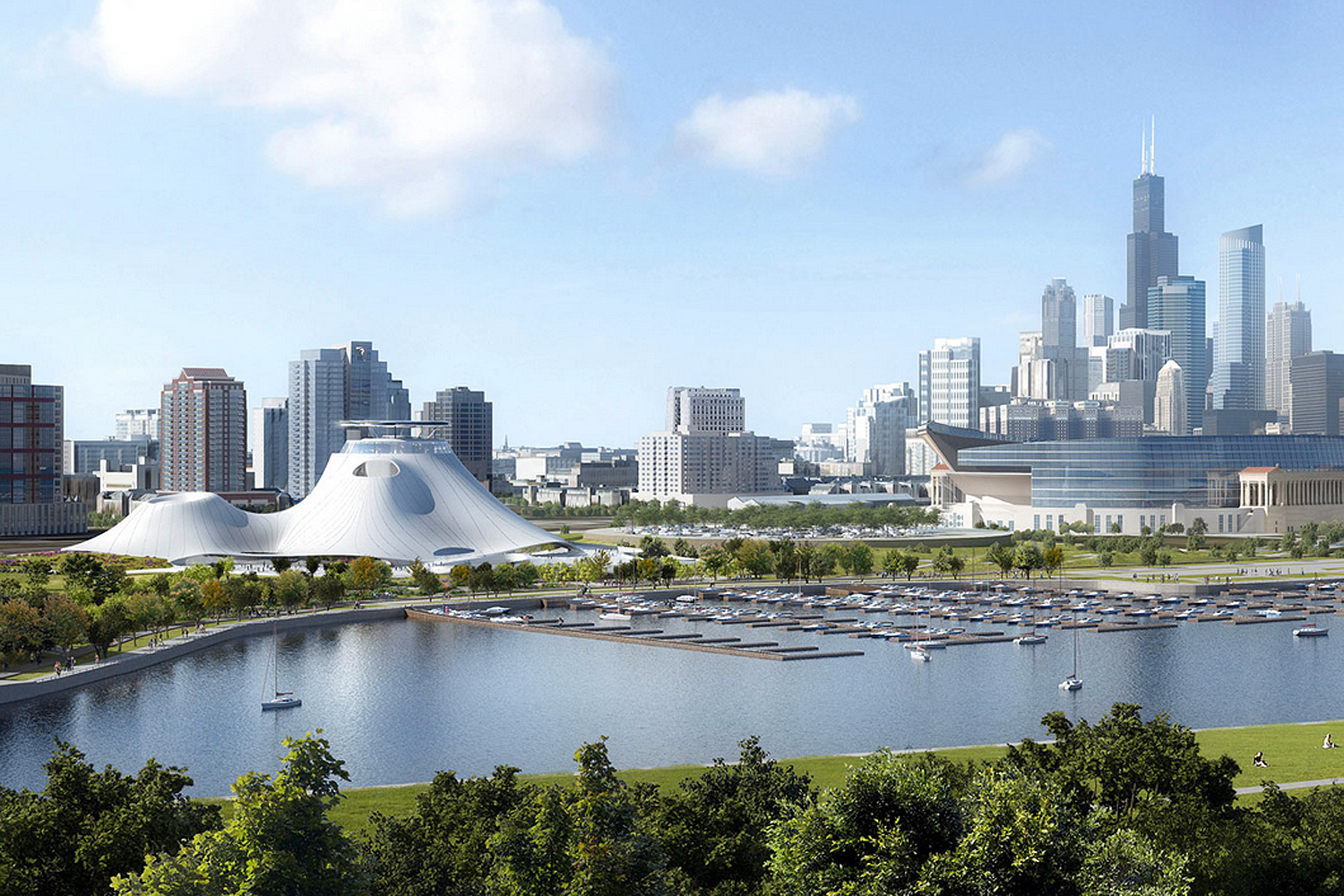Recently, the proposed Lucas Museum of Narrative Art was in a holding pattern, with the city attempting a long-shot maneuver to get the Friends of the Parks' lawsuit out of the seemingly unfriendly federal court—perhaps a good strategy given the recent legal history of lakefront battles in those courts, but not one with an obvious chance of succeeding.
That all changed last night, when veteran Sun-Times city hall reporter Fran Spielman broke the news that the city was prepared to negotiate on long-held desires by FOTP to complete the city's almost-unbroken chain of lakefront parks. Her colleague Michael Sneed moved the story even further, reporting that the FOTP had voted to "restart negotiations"; then the FOTP walked that back, sort of, to Crain's Greg Hinz.
All worth reading, especially between the lines, as there are a couple interesting details.
One is that the city could offer to work on FOTP's "Last Four Miles" proposal, to "establish complete, uninterrupted public access to Chicago's cherished lakefront," outlined here. It would fill in two miles on the South Side (from the South Shore Cultural Center to Rainbow Beach, and the old U.S. Steel site from 79th Street to Calumet Park) and on the North Side (from Ardmore to Loyola Park and Touhy to the north border of the city).
But FOP has tried to do this before, as the Trib reported in 2008:
None of the proposals materialized. Activists further north in the Rogers Park neighborhood opposed efforts expanding the shore. They fought attempts to build marinas and helped pass an advisory referendum opposing an extension of Lake Shore Drive.
[…]
The [FOTP's] proposal last spring to create an archipelago of islands along the South Shore from 71st to 75th streets and extend the bike path south met with opposition from property owners near the lake. Last month, the residents successfully passed a non-binding referendum against the plan.
Bill Savage, a Northwestern professor, writer, and longtime resident of Rogers Park, made the case against it:
Instead of Burnham, how about a little Jane Jacobs? One of the things that makes cities vital, she proved, is variety in various forms.
Variety of age of buildings, variety of uses of urban spaces throughout the day, economic variety woven into neighborhoods. Rogers Park’s street-end beaches should be preserved if for no other reason than to have a variety of ways in which Chicago’s urban spaces connect to the natural world of the Lake. Sure, it would be great if there were no private beaches, but it’s not the end of the world. That land was private before Rogers Park and Edgewater became part of Chicago; it’s history, not economic perfidy, that created these exceptions.
(What Savage means by "street-end beaches" are Rogers Beach, Howard Beach Park, Fargo Beach Park, and Marion Mahony Beach Park, where streets like Jarvis and Howard literally dead-end at small beaches that are broken up by waterfront buildings—which, residents have contended, would see their property values decrease if they became parkfront, not lakefront buildings.)
So if the FOTP and the city could work something out, that would open up a whole new set of negotiations that have been tried before, not so very long ago.
The second is Sneed's report that FOTP's board leaned toward the plan to replace the Lakeside Center at McCormick Place, which was the city's second idea after FOTP shot down the Soldier Field parking lot location.
A couple months ago, Lee Bey explored the building for the Reader, taking some beautiful pictures of it; he admits that it's underutilized and likely to become even more so, but favors redeveloping rather than razing the faded modernist gem. "Given Lakeside Center has needed a financial shot in the arm—and a dramatic new use—for at least 15 years," Bey writes, "to spend almost a billion dollars to wreck the building only to put a new one in its place is like a rescue plane finally coming for a long-lost castaway—and then dropping a bomb on him."
Bey's photography makes a strong case for his argument. But that would require George Lucas to drop his futuristic, not-un-Star-Wars-like design from starchitect Ma Yansong.
So, in sum: It seems that FOP wants to negotiate; that they may favor the plan described as an "expensive longshot" requiring the legislature and the governor to sign off on it, which … well, you know; and that an element of negotiations, the Last Four Miles plan, would require revisiting already contentious ground.
In other words, totally normal as far as the history of Chicago lakefront politics.



